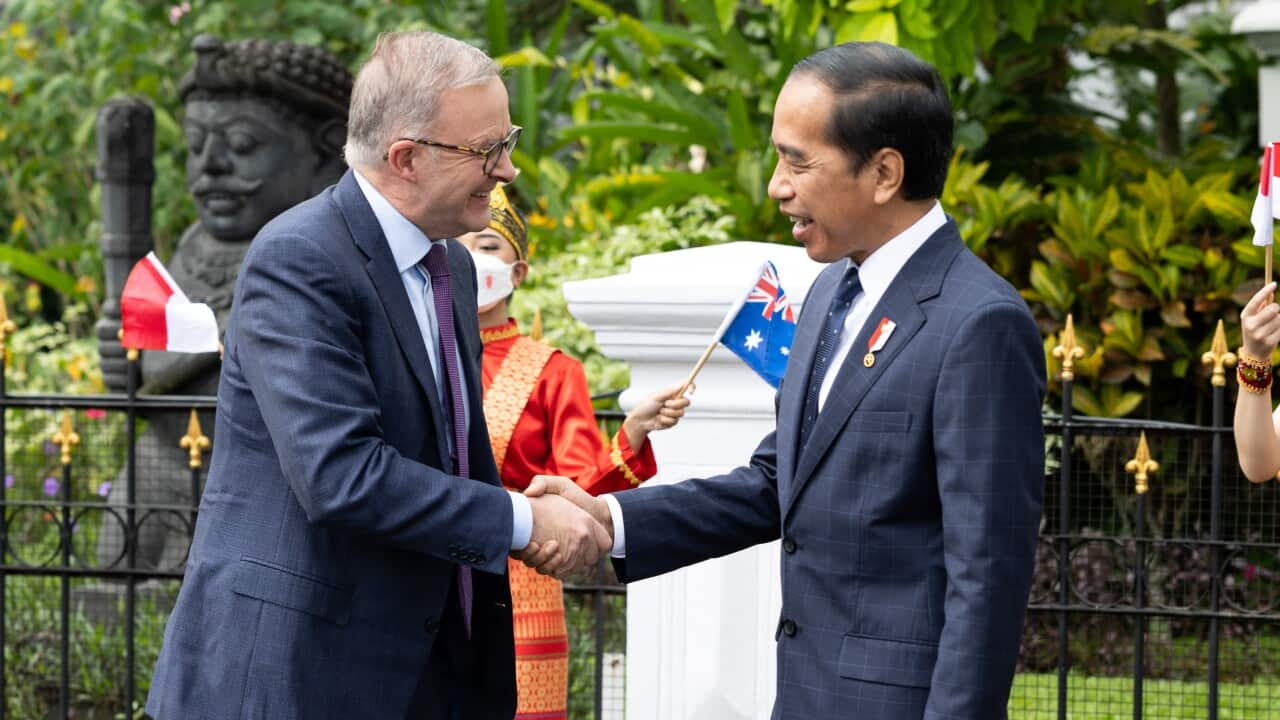Key Points
- More than a hundred Australians have been banned from entering Russia indefinitely in the latest swathe of sanctions imposed by Russia.
- These include high-profile ABC journalists including Stan Grant, Patricia Karvelas and Ita Buttrose, as well as billionaires Gina Rinehart and Harry Triguboff.
The Russian government has announced it is sanctioning a further 121 Australian citizens including journalists, business people and army officials from entering Russia.
Russia's foreign ministry said on Thursday night the move to blacklist the Australians was in response to Australian government sanctions against Russian individuals, put in place following the Russian invasion of Ukraine on 24 February.
Those sanctioned include ABC chair Ita Buttrose, News Corp co-chair Lachlan Murdoch and Defence Force chief General Angus Campbell alongside various business people, newspaper editors, academics and think tank heads.
SBS Chair George Savvides was also on the Russian Foreign Ministry's list, and responded by saying the SBS board and management are "proud of and stand by our coverage of Russia's invasion of Ukraine".
"Across all our services, including SBS World News and our SBS Russian and SBS Ukrainian language services, we have provided audiences in Australia with strong and impartial coverage of the conflict. It is a clear demonstration of the vital role of a free press within our democracy," he said.
Mr Savvides' inclusion comes after the Russian Ministry of Foreign Affairs (MFA) accused the SBS Russian language radio service of joining a “Russiaphobic campaign” in its Ukraine war coverage on 14 June.
South Australian Premier Peter Malinauskas is the first Australian state leader to be sanctioned. He said travelling to Russia wasn't on his bucket list anyway.
"I'm very grateful for the fact that Vladimir Putin has paid attention to the leading role that South Australia is paying for standing up for the democratic values that we collectively as a country hold dear," Mr Malinauskas said with a smile during the National Cabinet meeting on Friday.
He pointed to his Lithuanian surname, Malinauskas, when drawing on his personal experiences against "unacceptable Russian aggression".
"My heritage - Malinauskus is a Lithuanian last name - my family knows all too well the human tragedy that can occur in the face of unacceptable Russian aggression," he said.
"I am very proud of the fact that my government has played a leadership role and I look forward to doing that in the future."
Lithuania, a small country that has declared itself independent of the Soviet Union, has been one of the most vocal European nations against Russia's invasion of Ukraine.
ABC's breakfast Radio National program host Patricia Karvelas has been included on the list, as well as international affairs analyst Stan Grant, who removed a pro-Russian viewer from the Q&A audience in March this year.
Another Australian on the list is the founder of property developer Meriton and one of Australia's richest people, Harry Triguboff. He is the son of Russian parents who fled Russia to China to escape anti-Semitism, where he was born in 1933.
Since Russia's invasion of Ukraine, Mr Triguboff has been vocal in his support for Ukrainian refugees, pledging more than $200,000 to support those displaced since the war began.
Other media personalities banned include newspaper and television political commentator Andrew Bolt, television reporter Liz Hayes, editor-in-chief of The Australian newspaper, Chris Dore, Atlassian co-founders Mike Cannon-Brookes and Scott Farquhar, mining magnates Andrew "Twiggy" Forrest and Gina Rinehart as well as Nine Entertainment Group chair Peter Costello.
The Russian foreign ministry said that it could expand the blacklist as the Australian government "does not seem inclined to abandon its anti-Russia policy line and continues to produce new sanctions".
It describes the incursion of its forces into Ukraine as a "special military operation" to disarm and "denazify" its neighbour. Ukraine and its allies have rejected this as nonsense.
In a statement to SBS News, a spokesperson for Russia's embassy in Australia said it would not go into the detail of how or why individuals were designated with sanctions.
"In the case of media practitioners, they were sanctioned for their role in the blatantly biased coverage of events in Ukraine, including unscrupulously feeding Australians with absurd lies produced by the Ukrainian propaganda," the spokesperson said.
Earlier this year, Australia and more than 30 local officials in the eastern Ukrainian separatist regions of Donetsk and Luhansk.
Russia announced a similar move against dozens of British journalists on Tuesday, in what Moscow said was a response to Western sanctions and the "spreading of false information about Russia".
Britain on Thursday said it had sanctioned Russian Children's Rights Commissioner Maria Lvova-Belova and the head of the Russian Orthodox Church, Patriarch Kirill, as part of a new wave of sanctions against Russia over the Ukrainian crisis.
The Foreign Office said it had sanctioned Ms Lvova-Belova for the forced transfer and adoption of Ukrainian children, while Mr Kirill was targeted for "his prominent support of Russian military aggression in Ukraine".
The statement added that four senior military officials from a unit "known to have killed, raped, and tortured civilians" in the Ukrainian town of Bucha were also sanctioned.
Russia has denied the allegations.
Britain's Foreign Secretary Liz Truss said in a statement: "We are targeting the enablers and perpetrators of (Russian President Vladimir) Putin's war who have brought untold suffering to Ukraine, including the forced transfer and adoption of children."
The government said the sanctions also targeted Mr Putin's allies, military commanders and Russian and Myanmar arms dealers.











